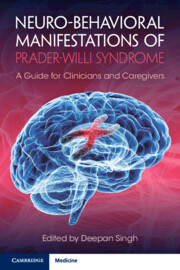Book contents
- Neuro-behavioral Manifestations of Prader-Willi Syndrome
- Neuro-behavioral Manifestations of Prader-Willi Syndrome
- Copyright page
- Dedication
- Contents
- Contributors
- Preface
- Acknowledgments
- Chapter 1 Knowing Your Patient
- Chapter 2 Caregiver Burden in Prader-Willi Syndrome
- Chapter 3 Establishing a Relationship with a Mental Healthcare Provider
- Chapter 4 Sleep Disorders in Prader-Willi Syndrome
- Chapter 5 Autism in Prader-Willi Syndrome
- Chapter 6 Anxiety in Prader-Willi Syndrome
- Chapter 7 Picking, Hoarding, and Elopement in Prader-Willi Syndrome
- Chapter 8 Attention-Deficit/Hyperactivity Disorder in Prader-Willi Syndrome
- Chapter 9 Agitation and Aggression in Prader-Willi Syndrome
- Chapter 10 Mood Disorders in Prader-Willi Syndrome
- Chapter 11 Psychotic Disorders in Prader-Willi Syndrome
- Chapter 12 Psychopharmacology in Prader-Willi Syndrome
- Chapter 13 A Caregiver’s Perspective
- Chapter 14 The Neurobiology of Prader-Willi Syndrome
- Chapter 15 Final Reflections on the Neuro-behavioral Manifestations of Prader-Willi Syndrome
- Index
- References
Chapter 10 - Mood Disorders in Prader-Willi Syndrome
Published online by Cambridge University Press: 26 May 2022
- Neuro-behavioral Manifestations of Prader-Willi Syndrome
- Neuro-behavioral Manifestations of Prader-Willi Syndrome
- Copyright page
- Dedication
- Contents
- Contributors
- Preface
- Acknowledgments
- Chapter 1 Knowing Your Patient
- Chapter 2 Caregiver Burden in Prader-Willi Syndrome
- Chapter 3 Establishing a Relationship with a Mental Healthcare Provider
- Chapter 4 Sleep Disorders in Prader-Willi Syndrome
- Chapter 5 Autism in Prader-Willi Syndrome
- Chapter 6 Anxiety in Prader-Willi Syndrome
- Chapter 7 Picking, Hoarding, and Elopement in Prader-Willi Syndrome
- Chapter 8 Attention-Deficit/Hyperactivity Disorder in Prader-Willi Syndrome
- Chapter 9 Agitation and Aggression in Prader-Willi Syndrome
- Chapter 10 Mood Disorders in Prader-Willi Syndrome
- Chapter 11 Psychotic Disorders in Prader-Willi Syndrome
- Chapter 12 Psychopharmacology in Prader-Willi Syndrome
- Chapter 13 A Caregiver’s Perspective
- Chapter 14 The Neurobiology of Prader-Willi Syndrome
- Chapter 15 Final Reflections on the Neuro-behavioral Manifestations of Prader-Willi Syndrome
- Index
- References
Summary
Mood disorders have a wide range of presentation – from major depressive episodes to mania. Both depression and mania can present with irritability; the notable differences between them are discussed in this chapter. Persistent sad mood and lack of enjoyment in usual activities is typically noted in depression, while a lack of need for sleep along with euphoric mood is typical for mania. Due to the spectrum of intervening mood disorders such as bipolar II illness and persistent depressive disorder, a thorough psychiatric evaluation is important. Since mood disorders may lead to dangerousness in the form of self-harm behavior, suicidality, and violence, a sudden and persistent change in mood should be considered a psychiatric emergency. Suicide is rare but unpredictable. Direct questions on whether a patient has thoughts about self-harm are important to differentiate habitual threatening statements from real intent. Treatment options for mood disorders including psychotherapy and medication management are discussed. Episodic mood disorders covered in this chapter are all treatable conditions when identified promptly and under the care of experienced mental health providers.
Keywords
- Type
- Chapter
- Information
- Neuro-behavioral Manifestations of Prader-Willi SyndromeA Guide for Clinicians and Caregivers, pp. 90 - 102Publisher: Cambridge University PressPrint publication year: 2022

